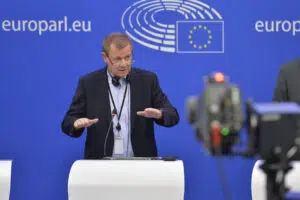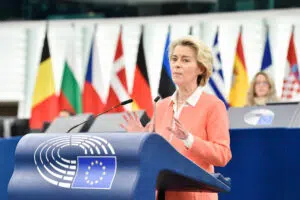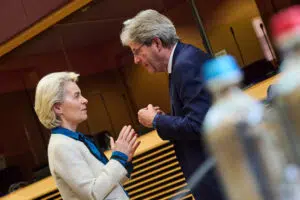Brussels – The European Parliament’s lunge is as serious as the rift between the three major political forces supporting the EU executive led by Ursula von der Leyen is deep. ‘Piepergate,’ the political case that erupted following the appointment of MEP Markus Pieper as EU envoy for small and medium-sized enterprises (SMEs), is now being taken to a new level with an overwhelming majority vote by MEPs in the plenary session to call for revocation of the appointment and a transparent and open process for the selection of the EU SME envoy.
 The vote against Pieper’s nomination came today (April 11) through an amendment to the European Commission’s 2022 budget discharge under the first signature Daniel Freund (Greens/Ale), which passed with 382 votes in favor, 144 against, and 80 abstentions. In other words, only MEPs from the European People’s Party opposed the amendment, siding with von der Leyen’s choice in favor of her fellow party member from the Christian Democratic Union of Germany (CDU). European populars defending European populars.The group of the Progressive Alliance of Socialists and Democrats (S&D) and the liberal group of Renew Europe instead lined up en bloc against the Commission’s number one, supported by the Greens/Ale, The Left, and the far-right Identity and Democracy (to which the League belongs). Apart from a few exceptions the European Conservatives and Reformists group (to which Fratelli d’Italia belongs) abstained.
The vote against Pieper’s nomination came today (April 11) through an amendment to the European Commission’s 2022 budget discharge under the first signature Daniel Freund (Greens/Ale), which passed with 382 votes in favor, 144 against, and 80 abstentions. In other words, only MEPs from the European People’s Party opposed the amendment, siding with von der Leyen’s choice in favor of her fellow party member from the Christian Democratic Union of Germany (CDU). European populars defending European populars.The group of the Progressive Alliance of Socialists and Democrats (S&D) and the liberal group of Renew Europe instead lined up en bloc against the Commission’s number one, supported by the Greens/Ale, The Left, and the far-right Identity and Democracy (to which the League belongs). Apart from a few exceptions the European Conservatives and Reformists group (to which Fratelli d’Italia belongs) abstained.

The EU Parliament had already raised doubts about the selection of Christian Democrat Pieper with a written question by 12 MEPs from the Green/Ale, S&D, Renew Europe, and La Sinistra groups on February 29. The Commission was required to respond to the “additional qualifications” that allowed Pieper to outperform the other candidates in the selection process and to “questions about the transparency of the process and the influence of the Commission president.” It is no coincidence that Czech MEP Martina Dlabajová (Renew Europe), a candidate for the post, filed an appeal with the Commission’s Directorate-General for Human Resources. The European Parliament “notes with concern that the successful candidate is an outgoing MEP from the German political party of President von der Leyen,” reads the amendment approved today in plenary session, which at this point “calls on the Commission to remediate the situation by revoking the nomination and initiating a truly transparent and open process for the selection of the EU SME Envoy.”
Curt was the comment of the chief spokesman of the EU executive, Eric Mamer, during the daily press briefing: “We do not react to individual amendments that have been voted” on the Commission’s budget discharge. Without sparing a dig at MEPs about the fact that “Parliament has the right to vote, but we have our institutional autonomy” and clearing the field of doubts that the latest political developments may have affected Pieper’s appointment: “Yes and yes,” was the answer to a question regarding the Commission’s belief that the CDU MEP is the best candidate and whether he will begin the assignment-as stipulated in the contract signed on March 31- from April 16.
The ‘Pipergate’ case inside the EU Commission
It all started last January 31, when the European Commission’s services announced the appointment of Pieper as EU envoy for SMEs – to keep a “close relationship” with national business representatives – taking office “subsequently” and reporting directly to President von der Leyen and Commissioner Breton. According to reports from the Commission, Pieper had “extensive experience and expertise in SME policies” as a member of the European Parliament’s Committee on Industry, Research and Energy (ITRE) in this legislature (he has been an MEP since 2004) and had demonstrated “a commendable track record” in strategic relations “with a diverse range of stakeholders, demonstrating strong leadership, advocacy, and negotiating skills.”

From left: European Commission President Ursula von der Leyen and Economy Commissioner Paolo Gentiloni
After the parliamentary question on ‘Piepergate’ remained ignored for a month by President von der Leyen, on March 27, four members of the College – Thierry Breton (responsible for Internal Market), Paolo Gentiloni (Economy), Nicolas Schmit (Labor and Social Rights, as well as Spitzenkandidat of the European Socialist Party) and Josep Borrell (Vice-President of the Commission and EU High Representative for Foreign Affairs and Security Policy) – wrote a letter to the president of the Commission to explicitly request a discussion “at the earliest possible opportunity” within the College on “these allegations and the possible impact on the next steps in the recruitment process” of Pieper.In addition to party affiliations (Gentiloni, Schmit, and Borrell are social democrats, while Breton is a liberal), the fact that President von der Leyen bypassed the recommendation in favor of Dlabajová by Breton, who was responsible for judging the most suitable candidate, brought about the move by the four Commissioners.
Meanwhile, there is also the case for the nomination of the chief of staff, Björn Seibert, and the newly appointed director for ‘Communication and Political Services,’ at the Directorate General for Communication (Dg Comm), Alexander Winterstein, to campaign manager and communications and media relations manager, respectively, for von der Leyen as EPP top candidate. Responding to the four commissioners’ letter was their colleague in charge of the budget, Johannes Hahn – also from the European People’s Party family like von der Leyen and Pieper – who, on the President’s proxy, assured that “the decision is entirely in line with the rules.” However, the same four commissioners addressed a second letter to von der Leyen, pointing the finger at the fact that the appointment did not consider the rule of collegiality requiring all Commissioners to participate in the selection process. For this very reason, half the College is reportedly up in arms against the President, with seven other members dissatisfied: Margrethe Vestager(Executive Vice-President and Commissioner for Competition), Věra Jourová (Vice-President for Values and Transparency), Didier Reynders (responsible for Justice), Elisa Ferreira (for Cohesion and Reforms), Kadri Simson(for Energy), Janez Lenarčič (for Crisis Management), and Helena Dalli (for Equality).
English version by the Translation Service of Withub









